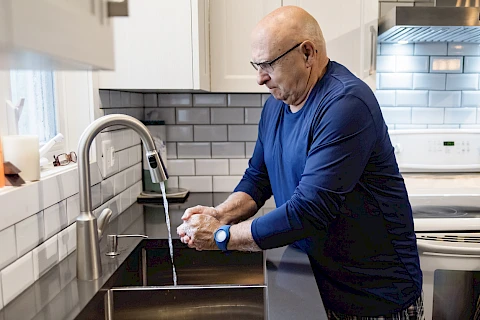
Flu season can be a challenging time for our senior loved ones who are more vulnerable to complications. They are at risk of experiencing severe symptoms and may find it harder to fight off flu infections. Seniors often have other health issues that can exacerbate the illness. Senior Helpers understands the importance of keeping seniors safe and healthy. We offer this guide for caregivers to help them protect seniors and navigate the flu season with confidence.
The Necessity of Flu Shots
Seniors are at a higher risk of flu complications due to weakened immune systems. The flu can lead to acute health issues like pneumonia, hospitalization, and even death. This makes getting the flu shot critical. It significantly reduces the potential of getting the flu along with its complications. Even if a vaccinated senior catches the flu, the symptoms are usually milder and the recovery is quicker. Flu shots are accessible and convenient. You can get them at local pharmacies, doctor's offices, and community health centers. Some locations offer flu shots for free or at a reduced cost. By getting vaccinated, seniors can protect themselves and those around them.
Good Hygiene Practices
Practicing good hygiene is crucial in preventing the spread of the flu. Here are some essential actions:
- Regular Handwashing — Wash hands with soap and water for at least 20 seconds. This is especially vital after being in public places or after coughing and sneezing.
- Use Hand Sanitizers — If soap and water are unavailable, use a hand sanitizer with at least 60% alcohol to clean your hands.
- Avoid Close Contact — Stay away from people who are sick. If a senior is sick, keep some distance to prevent the spread of germs.
- Clean and Disinfect — Make it a habit to clean and disinfect frequently touched surfaces like doorknobs, light switches, and remote controls.
Early Symptoms of the Flu
Common flu symptoms in seniors include fever, cough, sore throat, runny or stuffy nose, body aches, headaches, chills, and fatigue. Seniors might also experience confusion or dizziness, which are less common in younger people. It is essential to differentiate between flu and common cold symptoms. The flu usually comes on suddenly and severely, while cold symptoms develop gradually and are generally milder. Act quickly if you notice any flu-like symptoms in your senior loved one. Early detection and antiviral treatment can reduce the severity and duration of the flu.
What to Do If a Senior Shows Signs of the Flu
Take immediate steps to care for seniors if you suspect they have the flu. Ensure they get plenty of rest and encourage your loved one to avoid strenuous activities. Keep them hydrated as flu can lead to dehydration. Make sure they drink plenty of fluids like water, broth, and juice. Over-the-counter medications like fever reducers and pain relievers can help alleviate symptoms. Always consult a healthcare provider before giving new medications. Monitor symptoms closely, keep an eye on their condition, and watch for any signs of worsening. If symptoms get worse or you notice difficulty breathing, chest pain, confusion, or severe weakness, seek medical advice promptly.
Senior Helpers is Here During Flu Season
Senior Helpers is your number-one name in comprehensive, in-home senior care services. If you live in the Cameron Park, Sacramento, El Dorado Hills, or Shingle Springs areas, contact us today at Senior Helpers Cameron Park - El Dorado County. We are here to help protect your senior loved ones during flu season and every other time of the year.